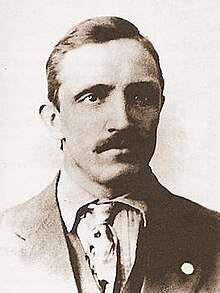This article may require copy editing for grammar, style, cohesion, tone, or spelling. (February 2024) |
Robert Prager | |
|---|---|
 | |
| Born | February 28, 1888 |
| Died | April 5, 1918 (aged 30) |
| Burial place | St. Louis, Missouri 38°34′35″N 90°16′16″W / 38.5764703°N 90.2711041°W |
| Occupation | Miner |
| Known for | German national lynched in the United States during World War I |
Robert Paul Prager (February 28, 1888 – April 5, 1918) was a German immigrant who was lynched in the United States during World War I as a result of anti-German sentiment. He had worked as a baker in southern Illinois and then as a laborer in a coal mine, settling in Collinsville, a center of mining. At a time of rising anti-German sentiment, he was rejected for membership in the Maryville, Illinois local of the United Mine Workers of America. Afterward he angered area mine workers by posting copies of his letter around town that complained of his rejection and criticized the local president.
A mob of 200 to 300 men forced Prager from his home in Collinsville, making him walk barefoot and wrapped in an American flag along Main Street, where they beat and harassed him. The police took him into custody, but the mob gained control again, taking him from Collinsville City Hall and accusing Mayor John H. Siegel of being pro-German. Failing to find tar in order to tar and feather Prager, as the workers had done to other victims, leaders of the mob used a rope and hanged him to death at a prominent bluff outside town.[1]
Eleven men were tried for Prager's murder, but all were acquitted. Rumors were that Prager held socialist beliefs, which were considered suspect at the time.[2] Men in the mob claimed he was planning to blow up the coal mine, but there was no evidence against him and he had not been charged with any crime.
- ^ Schwartz, E. A. (2002). "The Lynching of Robert Prager, the United Mine Workers, and the Problems of Patriotism in 1918". Journal of the Illinois State Historical Society. 95 (4): 414–437. JSTOR 40193598.
- ^ Hickey, Donald R. (Summer 1969). "The Prager Affair: A Study in Wartime Hysteria". Journal of the Illinois State Historical Society: 126–127.